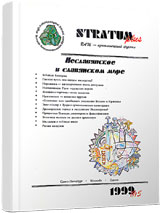Этногенез волохов, предков молдаван, по данным археологии (историографический аспект)
Ethno-genesis of the Vlachs, Moldovans’ Ancestors, According to the Archaeological Data (Historiographical Aspect)
Author(s): Gheorghii B. FyodorovSubject(s): History, Archaeology, Ethnohistory, Ancient World, Middle Ages, 6th to 12th Centuries
Published by: Издательский дом Stratum, Университет «Высшая антропологическая школа»
Summary/Abstract: The monograph Ethnogenesis of the Vlachs, Moldovans’ Ancestors, According to the Archaeological Data (Historiographical Aspect) was written by G.B. Fyodorov, famous scientist of Soviet period, in the beginning of 1980s, but owing to circumstances beyond the author’s control has still not been published. The monograph still preserves its scientific value. It deals with a critical analysis of Romanian historiography of 50s–70s dedicated to the issue of reconstruction of the Vlachs’ ethno-genesis on basis of archaeological researches. Fyodorov revealed a radical change in the opinions on the Vlachs’ ethno-genesis, accompanied by a complete “withdrawal” or limitation of the Slavic role in the ethno-genesis of the Eastern Roman peoples. Fyodorov distinguishes three basic stages in the ethno-genesis of the Eastern Roman peoples: First: from the turn of bronze – iron ages till I century A. D. includes creation of the Thracian ethnic unity, distinction of the two close related tribes – the Gets and the Dacians. Second: from II century A. D. till V century A. D. includes the Roman Conquest of the Dacia and romanisation of the Gets and the Dacians in Dacia and Moesia Inferior. Third: from VI century A. D. till the first centuries of II millennium A. D. – the period of Slavic settlements in Balkan and Danube lands; their participation in the ethno-genesis of the Eastern Romans as the third important element of the latter; assimilation of the Slavs by the romanised population as the last and final stage in the Eastern Roman ethno-genesis. The author is realistic about modest possibilities of the Archaeology concerning the issue of the Eastern Roman ethno-genesis study, yet he believes that the researches in this direction must be continued.
Journal: Stratum plus. Археология и культурная антропология
- Issue Year: 1999
- Issue No: 5
- Page Range: 14-74
- Page Count: 61
- Language: Russian

